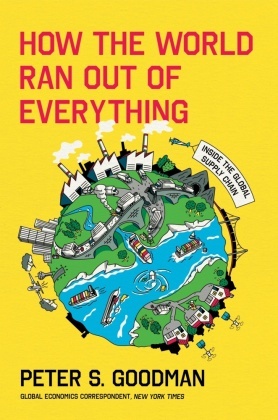
How the World Ran Out of Everything - Inside the Global Supply Chain
| Verlag | HarperCollins US |
| Auflage | 2024 |
| Seiten | 416 |
| Format | 15,2 x 22,8 x 3,0 cm |
| Gewicht | 528 g |
| Artikeltyp | Englisches Buch |
| EAN | 9780063257924 |
| Bestell-Nr | 06325792EA |
By the New York Times's Global Economics Correspondent, an extraordinary journey to understand the worldwide supply chain-exposing both the fascinating pathways of manufacturing and transportation that bring products to your doorstep, and the ruthless business logic that has left local communities at the mercy of a complex and fragile network for their basic necessities.
"A tale that will change how you look at the world." -Mark Leibovich
Named a Best Book of the Year by Foreign Policy and The Aspen Institute _ Longlisted for the Porchlight Business Book Award
How does the wealthiest country on earth run out of protective gear in the middle of a public health catastrophe? How do its parents find themselves unable to locate crucially needed infant formula? How do its largest companies spend billions of dollars making cars that no one can drive for a lack of chips?
The last few years have radically highlighted the intricacy and fragility of the global supply chain. Enormous ships were stuck at sea, warehouses overflowed, and delivery trucks stalled. The result was a scarcity of everything from breakfast cereal to medical devices, from frivolous goods to lifesaving necessities. And while the scale of the pandemic shock was unprecedented, it underscored the troubling reality that the system was fundamentally at risk of descending into chaos all along. And it still is. Sabotaged by financial interests, loss of transparency in markets, and worsening working conditions for the people tasked with keeping the gears turning, our global supply chain has become perpetually on the brink of collapse.
In How the World Ran Out of Everything, award-winning journalist Peter S. Goodman reveals the fascinating innerworkings of our supply chain and the factors that have led to its constant, dangerous vulnerability. His reporting takes readers deep into the elaborate system, showcasing the triumphs and struggles of the human players who op erate it-from factories in Asia and an almond grower in Northern California, to a group of striking railroad workers in Texas, to a truck driver who Goodman accompanies across hundreds of miles of the Great Plains. Through their stories, Goodman weaves a powerful argument for reforming a supply chain to become truly reliable and resilient, demanding a radical redrawing of the bargain between labor and shareholders, and deeper attention paid to how we get the things we need.
From one of the most respected economic journalists working today, How the World Ran Out of Everything is a fiercely smart, deeply informative look at how our supply chain operates, and why its reform is crucial-not only to avoid dysfunction in our day to day lives, but to protect the fate of our global fortunes.
Rezension:
"Captivating. . . . A tale that will change how you look at the world." - Mark Leibovich, author of This Town and Thank You For Your Servitude
"Recent years have exposed the precarity of global supply chains. In his new book, Peter S. Goodman, the New York Times's global economics correspondent, takes readers inside this system, analyzes the factors that made it so fragile, and argues that it is overdue for reform." - Foreign Policy, "The Most Anticipated Books of 2024"
"Tracks the supply chain disruptions of recent years, and in particular how efficient market theory led to too much concentration in a handful of places. It's a smart and detailed look at the topic which hasn't really had a deep reported dive since Barry Lynn's The End of the Line back in 2005." - Rana Foroohar, Financial Times, "Recommended Reading"
"The Covid-19 pandemic exposed the fragility of supply chains, but this well-documented study shows how the problem has deep roots....This boo k should be in the hands of policymakers and economists before the next crisis emerges. Goodman is willing to ask difficult questions, and he amply demonstrates that low prices can come with high costs." - Kirkus Reviews (starred review)
"How the World Ran Out of Everything is a fascinating crash course in the global supply chain. Like Michael Lewis, Peter Goodman tells a business story in clear, lively prose. Here he shows how corporate America goosed its balance sheets with a system that minimized inventories and maximized stock prices, squeezing truck drivers and railroad workers and ultimately leaving consumers in the lurch when this fragile construct came crashing down. Read this book and you'll end up a lot smarter and much angrier." - Barbara Demick, author of Eat the Buddha and Nothing to Envy
"[A] colorful and very readable look at how the Covid-19 pandemic wreaked havoc with supply chains." - Wall Street Journal
